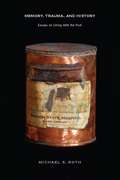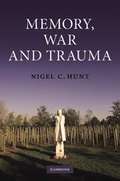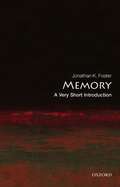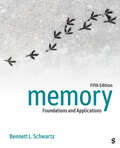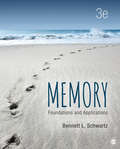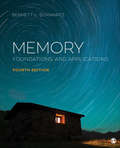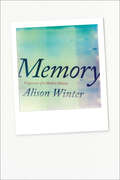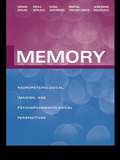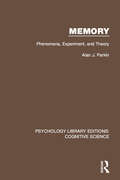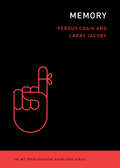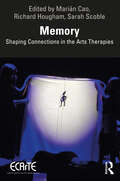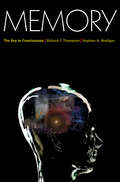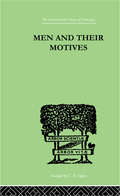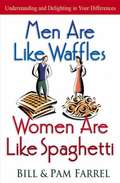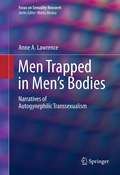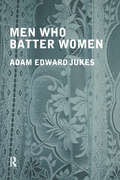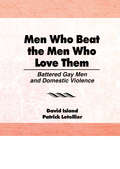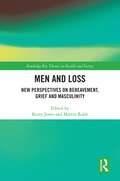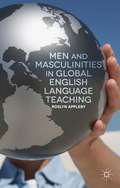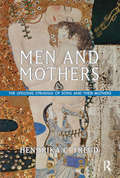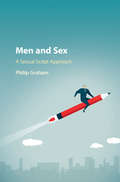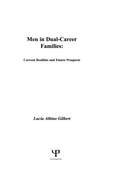- Table View
- List View
Memory, Trauma, and History: Essays on Living with the Past
by Michael RothIn these essays, Michael S. Roth uses psychoanalysis to build a richer understanding of history, and then takes a more expansive conception of history to decode the cultural construction of memory. He first examines the development in nineteenth-century France of medical criteria for diagnosing memory disorders, which signal fundamental changes in the understanding of present and past. He next explores links between historical consciousness and issues relating to the psyche, including trauma and repression and hypnosis and therapy. Roth turns to the work of postmodern theorists in connection with the philosophy of history and then examines photography's capacity to capture traces of the past. He considers how we strive to be faithful to the past even when we don't care about getting it right or using it productively. Roth concludes with essays defending pragmatic and reflexive liberal education. Drawing on his experiences as a teacher and academic leader, he speaks of living with the past without being dominated by it.
Memory, War and Trauma
by Nigel C. Hunt<p>Many millions of people are affected by the trauma of war. Psychologists have a good understanding of how experiences of war impact on memory but the significance of external environmental influences is often disregarded. Memory, War and Trauma focuses on our understanding of the psychosocial impact of war in its broadest sense. Nigel C. Hunt argues that, in order to understand war trauma, it is critical to develop an understanding not only of the individual perspective but also of how societal and cultural factors impact on the outcome of an individual's experience. <p>This is a compelling book which helps demonstrate why some people suffer from post-traumatic stress when other people don't, and how narrative understanding is important to the healing process. Its multi-disciplinary perspective will enable a deeper understanding of both individual traumatic stress and the structures of memory. </p>
Memory: A Very Short Introduction
by Jonathan K. Foster"Why can we sometimes remember events from our childhood as if they happened yesterday, but not what we did last week? How are memories stored in the brain, and how does our memory change as we age? What happens when our memory goes wrong, and how easy is it for others to manipulate our memories?" "This fascinating Very Short Introduction brings together the latest research in psychology and neuroscience to address these and many other important questions about the science of memory - revealing how our memory works, why we couldn't live without it, and even how we may learn to remember more."--BOOK JACKET.
Memory: Foundations and Applications
by Bennett L. SchwartzMemory: Foundations and Applications covers key memory models, theories, and experiments, and demonstrates how students can improve their own ability to learn and remember. The new Fifth Edition includes research updates throughout, attention to individual, cross-linguistic, and cross-cultural differences, and support with how to assess evidence while minimizing personal bias to help students evaluate claims.
Memory: Foundations and Applications
by Bennett L. SchwartzMemory: Foundations and Applications covers key memory models, theories, and experiments, and demonstrates how students can improve their own ability to learn and remember. The new Fifth Edition includes research updates throughout, attention to individual, cross-linguistic, and cross-cultural differences, and support with how to assess evidence while minimizing personal bias to help students evaluate claims.
Memory: Foundations and Applications
by Dr Bennett L. SchwartzThe fully updated Third Edition of Bennett L. Schwartz’s Memory: Foundations and Applications engages students in an exploration of how memory works in everyday life through unique applications in areas such as education, job-related memory, investigations, and courtrooms. Throughout the book, integrated coverage of cognitive psychology and neuroscience connects theory and research to the areas in the brain where memory processes occur. Four overarching themes that create a framework for the text include: the active nature of learning and remembering; memory's status as a biological process; the multiple components of memory systems; and how memory principles can improve our individual ability to learn and remember. Featuring substantive changes that bring the book completely up to date, the Third Edition offers students an array of high-interest examples for augmenting their own memory abilities and appreciation of memory science.
Memory: Foundations and Applications
by Dr Bennett L. SchwartzThe fully updated Third Edition of Bennett L. Schwartz’s Memory: Foundations and Applications engages students in an exploration of how memory works in everyday life through unique applications in areas such as education, job-related memory, investigations, and courtrooms. Throughout the book, integrated coverage of cognitive psychology and neuroscience connects theory and research to the areas in the brain where memory processes occur. Four overarching themes that create a framework for the text include: the active nature of learning and remembering; memory's status as a biological process; the multiple components of memory systems; and how memory principles can improve our individual ability to learn and remember. Featuring substantive changes that bring the book completely up to date, the Third Edition offers students an array of high-interest examples for augmenting their own memory abilities and appreciation of memory science.
Memory: Foundations and Applications
by Dr. Bennett L. SchwartzAs author Bennett Schwartz says in Memory: Foundations and Applications, it is hard to imagine an aspect of psychology more fundamental than memory. This unique text covers key memory models, theories, and experiments, but goes a step further to demonstrate how students can apply these concepts to their everyday lives and improve their own ability to learn and remember. A new, three-pronged organization opens the text with an overview of the psychological science of Memory, builds expertise in advanced topics, and then allows the reader to think about how memory research can benefit society. Neuroscience research is integrated throughout each chapter to demonstrate our understanding of where memory processes occur and how researchers use data to shape memory theories. New to the Fourth Edition: New chapters on memory science's relevance to the legal system, memory issues in psychiatric disorders, and application of memory research to improving the efficiency of one&’s own memory. Reorganized chapter on memory development and an enlarged section on prospective memory now combined with the chapter on metamemory. Updated sections on cognitive maps, autobiographical memory and emotion, and expanded discussion of the memory component of Alzheimer&’s disease.
Memory: Foundations and Applications
by Dr. Bennett L. SchwartzAs author Bennett Schwartz says in Memory: Foundations and Applications, it is hard to imagine an aspect of psychology more fundamental than memory. This unique text covers key memory models, theories, and experiments, but goes a step further to demonstrate how students can apply these concepts to their everyday lives and improve their own ability to learn and remember. A new, three-pronged organization opens the text with an overview of the psychological science of Memory, builds expertise in advanced topics, and then allows the reader to think about how memory research can benefit society. Neuroscience research is integrated throughout each chapter to demonstrate our understanding of where memory processes occur and how researchers use data to shape memory theories. New to the Fourth Edition: New chapters on memory science's relevance to the legal system, memory issues in psychiatric disorders, and application of memory research to improving the efficiency of one&’s own memory. Reorganized chapter on memory development and an enlarged section on prospective memory now combined with the chapter on metamemory. Updated sections on cognitive maps, autobiographical memory and emotion, and expanded discussion of the memory component of Alzheimer&’s disease.
Memory: Fragments of a Modern History
by Alison WinterPicture your twenty-first birthday. Did you have a party? If so, do you remember who was there? Now step back: how clear are those memories? Should we trust them to be accurate, or is there a chance that you're remembering incorrectly? And where have the many details you can no longer recall gone? Are they hidden somewhere in your brain, or are they gone forever? Such questions have fascinated scientists for hundreds of years, and, as Alison Winter shows in Memory: Fragments of a Modern History, the answers have changed dramatically in just the past century. Tracing the cultural and scientific history of our understanding of memory, Winter explores early metaphors that likened memory to a filing cabinet; later, she shows, that cabinet was replaced by the image of a reel of film, ever available for playback. That model, too, was eventually superseded, replaced by the current understanding of memory as the result of an extremely complicated, brain-wide web of cells and systems that together assemble our pasts. Winter introduces us to innovative scientists and sensationalistic seekers, and, drawing on evidence ranging from scientific papers to diaries to movies, explores the way that new understandings from the laboratory have seeped out into psychiatrists' offices, courtrooms, and the culture at large. Along the way, she investigates the sensational battles over the validity of repressed memories that raged through the 1980s and shows us how changes in technology--such as the emergence of recording devices and computers--have again and again altered the way we conceptualize, and even try to study, the ways we remember. Packed with fascinating details and curious episodes from the convoluted history of memory science, Memory is a book you'll remember long after you close its cover.
Memory: Neuropsychological, Imaging and Psychopharmacological Perspectives
by Gérard Emilien Cécile Durlach Elena Antoniadis Martial Van der Linden Jean-Marie MaloteauxMemory: Neuropsychological, Imaging and Psychopharmacological Perspectives reviews critically the impact of recent neuropsychological and biological discoveries on our understanding of human memory and its pathology. Too often, insights from clinical, neurological and psychopharmacological fields have remained isolated and mutually unintelligible. Therefore the first part of this book provides both clinicians and neuroscientists with a broad view of the neuropsychology of memory, and the psychobiological processes it involves, including recent advances from imaging technology and psychopharmacology research. In the second part the authors go on to cover a comprehensive range of memory assessments, dysfunctions, impairments and treatments. This compendium of current research findings will prove an invaluable resource for anyone studying, researching or practising in the field of memory and its disorders.
Memory: Phenomena, Experiment and Theory (Psychology Library Editions: Cognitive Science)
by Alan J. ParkinOriginally published in 1993, this title provided a lively but comprehensive account of experimental and theoretical approaches to the study of human memory at the time. Throughout, the book integrates experimental findings with neuropsychological data and describes a wide range of fascinating memory phenomena. A central theme of the book concerns the organization of memory. The idea that memory is composed of a series of structures is contrasted with process accounts of how memory works. There is a substantial account of the explicit/implicit distinction in memory research – an area that had been the centre of much recent experimentation and debate. The book was intended primarily as an intermediate text for undergraduate and postgraduate psychology students but its interdisciplinary approach and accessible style will also make it of interest to others, such as neurologists, clinical psychologists and psychiatrists, for whom some understanding of memory research is required.
Memory: Selected Works Of Fergus I. M. Craik (The MIT Press Essential Knowledge series)
by Fergus Craik Larry JacobyA short, accessible primer on human memory, its workings, feats, and flaws, by two leading psychological researchers.Why do we vividly recall a traumatic childhood event but forget where we left our keys five minutes ago? How can a scent take us back fifty years while a colleague&’s name eludes us? In this compact introduction, two leading psychological researchers describe memory—how it works and why it sometimes doesn&’t; how it can be tricked, trained, or improved; and what changes with time. In a manner as engaging as it is informative, Fergus Craik and Larry Jacoby explain the strengths and weaknesses of memory. They trace evolving ideas about memory&’s function and present a down-to-earth account of modern views. Citing the latest research, they outline the processes for acquiring and retrieving memories and explore the distinction between conscious and unconscious processes. With insights into the workings of the brain, Craik and Jacoby also provide a succinct account of feats and failures of memory, emotion and false memories, and the effects of aging. Their book draws a clear picture, at once broad and concise, of current and classical views of memory, that most essential and often mysterious feature of human life.
Memory: Shaping Connections in the Arts Therapies
by Richard Hougham Sarah Scoble Marián CaoMemory is compilation of scholarly chapters by authors of global reputation in the arts therapies.This international publication reflects the theme of the 16th International Conference of the European Consortium for Arts Therapies (ECArTE), held in Vilnius, Lithuania. Questions of memory go to the very heart of our making sense of the world. This book brings together wide-ranging chapters, which address the question of memory, designed to stimulate understanding and debate in contemporary arts therapy education, practice and research.Writers from Canada, Estonia, Germany, Iceland, Lebanon, Lithuania, Spain, the UK and the US combine to create a topical publication, incorporating diverse and current thinking in art therapy, dance movement therapy, dramatherapy and music therapy. In this innovative compilation, authors offer different cultural perspectives on the conception of memory which informs epistemology across the field of arts therapy.This book will be of interest and relevance to those in the arts therapy community and to a broader readership, including students and professionals in the disciplines of psychology, sociology, psychotherapy, the arts, medicine, integrated health and education.
Memory: The Key To Consciousness
by Richard F. Thompson Stephen A. MadiganMemory is perhaps the most extraordinary phenomenon in the natural world. Every person's brain holds millions of bits of information in long-term storage. This vast memory store includes our extensive vocabulary and knowledge of language; the tremendous and unique variety of facts we've amassed; all the skills we've learned, from walking and talking to musical and athletic performance; many of the emotions we feel; and the continuous sensations, feelings, and understandings of the world we term consciousness. Without memory there can be no mind as we understand it. Focusing on cutting-edge research in behavioral science and neuroscience, Memory is a primer of our current scientific understanding of the mechanics of memory and learning. Over the past two decades, memory research has accelerated and we have seen an explosion of new knowledge about the brain. For example, there now exists a wide-ranging and successful applied science devoted exclusively to the study of memory that has yielded better procedures for eliciting valid recollections in legal settings and improved the diagnosis and treatment of memory disorders. Everyone fascinated by the scope and power of the human brain will find this book unforgettable.
Men And Their Motives: PSYCHO-ANALYTICAL STUDIES
by Flugel, J CFirst published in 1999. Routledge is an imprint of Taylor & Francis, an informa company.
Men Are Like Waffles, Women Are Like Spaghetti
by Bill Farrel Pam FarrelThe authors, a husband and wife team, invite couples to join them on a journey of laughter and discovery of the unique gifts God has given to each gender. Find practical ideas for honoring each other and help to solve the long-standing fights that many marriages experience. Find out why men are like waffles and why they still go well with the women who are like spaghetti.
Men Trapped in Men's Bodies
by Anne A. LawrenceThere are few topics in sex research as compelling and confounding to researchers, clinicians, and the general public as that of transsexualism. Upending normative notions of gender, eroticism, and identity, it poses significant scientific and clinical challenges. The book addresses a fascinating and largely unexplored topic within the study of transsexualism: The feelings and desires of conventionally masculine men who are attracted to women yet want to become women themselves. Through a collection and discussion of vivid first-person narratives, the book provides an in-depth examination of these men's unusual propensity to be sexually aroused by the thought of themselves as women and how these men's sexual feelings influence their decisions to seek or undergo sex reassignment. These narratives about autogynephilia by autogynephilic male-to-female (MtF) transsexuals provide the first comprehensive documentation of the erotic ideation that underlies the most common form of MtF transsexualism. The narratives provide empirical evidence for Blanchard's theory of MtF transsexual motivation, and thus are of interest to researchers and theorists studying the phenomenology of MtF transsexualism. The narratives are likely to be eye-opening to psychologists, psychiatrists, physicians, and other professionals who work with MtF transsexuals: Most clinicians probably do not fully appreciate the erotic underpinnings of their clients' condition. A better understanding of their clients' autogynephilic feelings and motivations would enable these professionals to provide more empathetic and effective clinical care.
Men Who Batter Women
by Adam Edward JukesMen who Batter Women presents a unique psycho-analytic perspective on clinical studies of the roots of male violence towards women. Most published work concentrates on the experiences of the female victims of domestic violence. This book is unusual in that it focuses on the male perpetrators. Adam Edward Jukes considers both feminist approaches to male violence and those perspectives that treat such violent behaviour as pathological. The author suggests the practical implications of his research for clinical treatment and explores how effectively psychotherapy can be used to treat men who batter women.
Men Who Beat the Men Who Love Them: Battered Gay Men and Domestic Violence
by Patrick Letellier David IslandDomestic violence in gay male relationships is the third largest health problem for gay men in America today. Men Who Beat the Men Who Love Them breaks the silence surrounding gay male domestic violence and exposes this hidden yet prevalent and destructive problem. The authors paint a vivid picture of gay men’s domestic violence, bringing its brutality to life by including personal narratives, written by one of the authors, by clearly defining what it is and what it is not through lists of violent acts and criminal code categories, and by thoroughly examining and analyzing the criminal, mental health, medical, political, and interpersonal issues involved. The authors boldly depart from the battered women’s literature by asserting that batterers have a diagnosable mental disorder, that battering is not gender based, and that much further criminalization of domestic violence is necessary.Striving for victim advocacy, the book underscores the idea that gay men’s domestic violence is totally unacceptable and is caused solely by individual abusive gay men who choose to batter. The book builds on and departs from what is known about domestic violence, with the authors challenging several fundamental premises in the literature, unabashedly identifying battering as a mental disorder. The authors explain that victims cannot stop their battering partners from battering and virtually all batterers choose to harm their partners in a premeditated fashion. The authors provide practical steps and suggestions for victims who want to leave and stay away from their violent partners and for friends who want to help battered gay men. Chapters describe the scope of the problem and refute myths and misconceptions. There are several detailed theory chapters in which the authors explain why gay men’s domestic violence occurs, who the batterers are, who the victims are at different stages of victimization, and how domestic violence can be stopped. A visionary, wide-ranging governmental and private plan of action is introduced, including lists of necessary laws and policies, as well as outlines of strong education, training, and advertising problems needed in various sectors of society. As a self-help book, Men Who Beat the Men Who Love Them provides practical information on a never-before discussed topic. As a trainer’s manual or teaching guide, it includes specific criteria for understanding the problem and for providing treatment.
Men and Loss: New Perspectives on Bereavement, Grief and Masculinity (Routledge Key Themes in Health and Society)
by Martin Robb Kerry JonesThis important book draws together new research and theories about bereavement, on the one hand, and men and masculinities on the other, to increase our understanding of men’s experience of loss and contribute towards improving support services for men following bereavement.Bereavement and loss are unavoidable events in life and can be challenging experiences for anyone, regardless of gender. However, in contemporary western cultures, men’s experience of bereavement continues to be framed by socially constructed ideas surrounding masculinity, which dictate that men must be stoic following a loss, with grief manifesting in either anger or despair. Men who do not grieve in accepted ‘masculine’ ways can feel judged, alienated or disenfranchised. This interdisciplinary and interprofessional collection presents theoretical analysis, reports of research findings, reviews of support and interventions, and a wealth of personal accounts. It includes chapters discussing partner loss, childhood bereavement, perinatal loss and bereavement through suicide, as well as bereavement at all stages of the life course.Men and Loss is an essential read for advanced students and researchers with an interest in men’s health and bereavement studies from a range of disciplinary backgrounds, including nursing, medicine, counselling, sociology, social work and psychology.
Men and Masculinities in Global English Language Teaching
by Roslyn ApplebyThis book draws on a range of sources, including tales of castaways, fictional narratives, and interviews with teachers in conversation schools and universities in Japan, to explore many current concerns around teacher identity, gender, and intercultural sexuality in global English language teaching.
Men and Mothers: The Lifelong Struggle of Sons and Their Mothers
by Hendrika C. FreudNot all men vie with their fathers for the love of their mothers. In some families the mother becomes the central figure for her son - the father is excluded (or excludes himself) and does not come between mother and son. The main thesis of this book - using clinical vignettes and quotes from the work of Marcel Proust to illustrate the author's points - is that in these cases fantasies of matricide replace patricide. Men develop their male gender identity by being permitted to separate from their mother early on, but when a man does not resolve his infantile tie to his mother he risks remaining in a passive and/or dependent position towards her. Over-identification with the mother might ensue, hampering masculine development. Mothers who seek emotional support by binding their sons too closely can become seductive towards them. The child is inclined to try to satisfy the emotional needs of his mother, and he fears rejection if he asserts his independence instead of complying.
Men and Sex: A Sexual Script Approach
by Philip GrahamMen and Sex provides a comprehensive yet accessible account of male sexuality by using the theoretical concept of the 'sexual script' to illuminate different aspects of men's sexual behaviour. Graham begins by discussing different theories of sexuality, before providing a more detailed description of sexual script theory. This proposes how male sexual behaviour can be explained as a result of cultural influences modified by individual experience and personality as well as by interaction with others. Individual chapters detail the development of sexual scripts in childhood and adolescence, masturbation, cultural influences on sexuality, heterosexual behaviour, variations and problems in sexual functioning, homosexual behaviour, transsexualism, procreative sex, coercive sexual behaviour, the impact of physical and mental health problems on sexuality, and sexuality and pornography. The concluding chapter looks at the future of male sexuality. The book makes a valuable contribution to the burgeoning literature on masculinity studies.
Men in Dual-career Families: Current Realities and Future Prospects (Vocational Psychology Series)
by Lucia Albino GilbertFirst published in 1985. Routledge is an imprint of Taylor & Francis, an informa company.
